The following blog post will be in German, as it is about an event that took place in Frankfurt this Wednesday evening. Following the Twitter back channel conversations during last week’s Ignite Frankfurt event (where attendees criticized the use of English instead of German), I realized that in order to reach those who are targeted, I will have to use their language. So the following will be a recap of the SocialBar event and a few thoughts about it – in German.
For those interested, the presentation I gave about AfriGadget tonight is very similar to the one I had given in London last year – only updated a few slides and included links to sites like appfrica.com, projectdiaspora.org or semasource.org. The reasoning is the same from my post back then, even my motivation for giving a talk on AG is pretty much the same. Imo, it’s all about giving another picture of “Africa”. One that may be different from what is usually known via the (partly biased) media. My colleague Steve Mugiri also presented AfriGadget during the TEDxAtlanta event on January 26 – if you can, pls check out his video. I also like it that everyone of us at AfriGadget has his/her own perspective & motivation for AfriGadget – and uses a different approach to highlight our work.
I think I am very passionate about this subject, and I consider “passion” a driving force for a lot of good projects. But anyways, I digress and should probably continue in German.
Auf Deutsch also. Dies war nun die vierte SocialBar in Frankfurt, dieses Mal relativ gut besucht, ca. 13? Teilnehmer aus verschiedenen Bereichen, mit verschiedener Motivation / Absichten / Erwartungen aber doch schon relativ ähnlichem sozialen und beruflichen Hintergrund.
Was ist eine SocialBar?
Laut der Website ist die SocialBar “ein Treffen von Weltverbesserern. Web-Aktivisten, Social Entrepreneurs, NGOs, ehrenamtliche Helfer, Politiker und Unternehmen mit sozialer Verantwortung kommen bei der Socialbar zusammen, um sich kennen zu lernen, Kontakte zu knüpfen, Erfahrungen auszutauschen und Kooperationen einzugehen.”
Trotz dieser Beschreibung wüsste ich aber immer noch nicht, wie man die SocialBar genauer beschreiben sollte – es ist eine Veranstaltung, an der interessierte Leute teilnehmen, die sich für soziale Themen interessieren. Sozial, im Sinne von: ich mache etwas, das ich nicht nur für mich alleine mache.
Vielleicht auch wegen dieser doch recht ungenauen Definition, meines eigenen Hintergrundes und der doch regionalen Unterschiede bei Events solcher Art (eine SocialBar in z.B. Berlin erreicht meistens ein anderes Publikum), kann ich natürlich nur für mich selber sprechen: ich empfinde die SocialBar als sinnvolle Veranstaltung, bei der ich vor allem Gleichgesinnte treffe, die sich “soziale Projekte” auf die Fahne geschrieben haben. Sei es aus beruflicher Natur, oder auch weil man in der Freizeit einen sinnvollen Beitrag für die Allgemeinheit leisten möchte und der 9-to-5 Tagesjob dies nur unzureichend ermöglicht. Und so kommen wir auch schon zum zweiten Vortrag des Abends: von Wolfgang Weicht über die “Coding Battle”, oder wie er es nennt: The Social Media Fight Club.
Kurz: mehrere Teams bestehend aus Programmierern, Konzeptern und anderen Kreativen arbeiten ehrenamtlich an einem Wochenende zusammen und als Teams gegeneinander, um einer NGO zu einer Website zu verhelfen.
Die Idee finde ich nach längerer Diskussion und einigen Bieren mit Wolfgang nicht ganz so verkehrt, aber vor allem interessiert mich daran natürlich die Frage, ob man in einer Stadt wie Frankfurt – die ich in diesem Bereich als sehr träge empfinde – eine kritische Masse von Leuten zusammenbringen kann, die in ihrer Freizeit – in einer (an den HipHop angelehnten) Battle oder auch einfach nur so – für Níchtregierungsorganisationen (de: NROs, en: NGOs) unentgeltlich und aus Spaß (!) an der Sache ehrenamtlich arbeiten wollen.
Die Frage nach der Teilnahme an so einem Event empfinde ich als sehr wichtig – immerhin funktionieren viele Einrichtungen in Deutschland nur deswegen, weil es ehrenamtliche Helfer gibt. Ohne direkte Bezahlung einfach mal schauen ob man im Kollektiv etwas erreichen kann – das empfinde ich als sehr spannende Idee. Klar, gibt es ja auch schon online in Form der Wikipedia – kollektives Zusammentragen von Wissen – aber die Leute dann von ihren Computerbildschirmen hin zu einem realen Treffen zu bewegen, wo sie sich aufraffen müssen und gemeinsam etwas erarbeiten – das ist schon anders. Und eben auf den Frankfurter Kontext bezogen. Leute anschreiben, motivieren, begeistern können, Leidenschaft wecken, hinterher sein und sicherstellen, dass sie auch wirklich kommen (ich hatte mich auch schon mal zu einem Treffen bei Wolfgang angemeldet und dann im letzten Moment abgesagt). Das ist alles irre viel Arbeit. Können die Organisatoren der SocialBar sicherlich auch bestätigen.
Ob die Coding Battle in dieser Form klappen wird – who knows?
Ob ich daran teilnehmen werde? Hell, yes! Weil:
“Leadership Lessons learned from Dancing Guy”, von Derek Sivers, dessen Videos eigentlich alle super sind, alleine schon wegen seiner netten Stimme.
Einen ähnlichen Ansatz hat uns dann noch Denis Engemann vorgestellt, Student der Psychologie & Philosophie, der uns von dem anstehenden WIRKCAMP 2010 (am 07.-09. Mai 2010) in Leipzig berichtet hat. Ein ähnlicher Ansatz also wie die Coding Battle, in Leipzig nennen sie es allerdings Synagieren – gemeinsam handeln: “wir bringen für 3 Tage engagierte Menschen in kleinen Projekten zusammen”.
Laut den auf der Website angekündigten Arbeitsgruppen wird es folgende Themen/Arbeitsschwerpunkte geben: Vegetarische Tage für die Uni-Mensa, Filmen für Nachhaltigkeit, Littlebird – Schmackhaft in den Arbeitsmarkt, Nachhaltigkeit im Internet und Konsum Global Leipzig. Aus studentischer Sicht macht dies alles schon irgendwie Sinn.
Am Ende des Abends bleiben für mich die folgenden Fragen: welche Themen sind die ultimative Garanten für eine Mitarbeit von Freiwilligen? Wie kann ich eine möglichst interessierte Anzahl von Mitbürgern zu einem unentgeltlichen Projekt bewegen? Sind solche Aktivitäten ein Hinweis auf die Arbeitsweise in der Zukunft (kleine, dezentrale Projekte, vernetzes Arbeiten)? Inwiefern definieren wir uns mit so einem – bisher nur ausserberuflichen – Ansatz heute schon die Arbeitswelt von morgen? Und: inwiefern unterscheidet sich eine SocialBar in Frankfurt von einer SocialBar in Dresden, Berlin, Bonn oder Hannover?


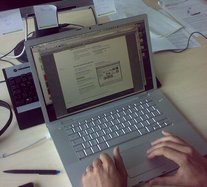 A friend of mine, older, but also online like me, sorted her online friends into at least two groups: a) people I’ve met offline, b) people I haven’t met offline.
A friend of mine, older, but also online like me, sorted her online friends into at least two groups: a) people I’ve met offline, b) people I haven’t met offline.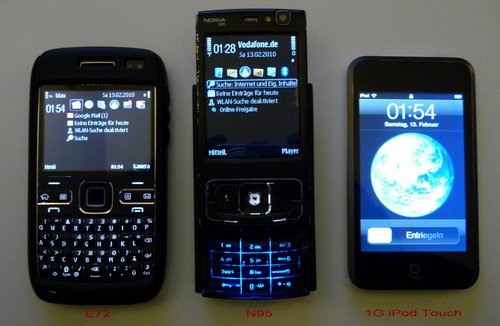
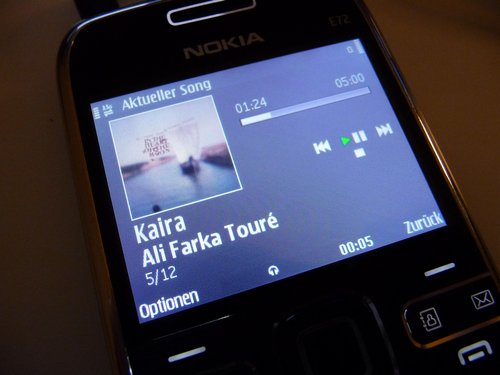
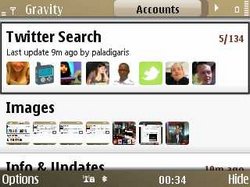 There can’t be enough praise for this application. It’s the only – really GOOD – application for S60. A Twitter / Identi.ca / FaceBook / Google Reader client, a software that will allow me to feed my three active Twitter accounts directly from the phone, check some subscriptions on Google Reader or comment on my friend’s FaceBook status updates.
There can’t be enough praise for this application. It’s the only – really GOOD – application for S60. A Twitter / Identi.ca / FaceBook / Google Reader client, a software that will allow me to feed my three active Twitter accounts directly from the phone, check some subscriptions on Google Reader or comment on my friend’s FaceBook status updates.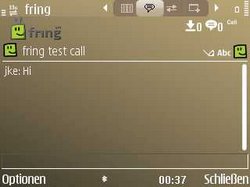 Fring is a chat & VoIP client for your phone. You can use it to connect via Skype, MSN, Google Talk, Yahoo Msg, ICQ, AIM, Facebok, Twitter, last.fm & Co with your friends. It’s free, it works, it wins.
Fring is a chat & VoIP client for your phone. You can use it to connect via Skype, MSN, Google Talk, Yahoo Msg, ICQ, AIM, Facebok, Twitter, last.fm & Co with your friends. It’s free, it works, it wins.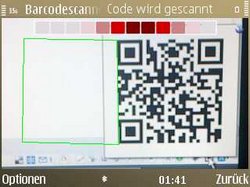 Nokia BarCode /
Nokia BarCode / 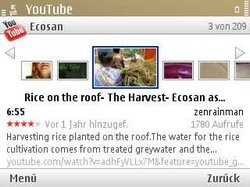

 Speaking of multimedia content, I’ve been searching for an application that will stream live TV to my phone. Something like
Speaking of multimedia content, I’ve been searching for an application that will stream live TV to my phone. Something like 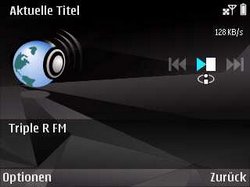 Came shipped as a pre-installed app on my N95, had to add it manually on the E72 though (use the one from the Nokia 6120 Navigator). Works brilliantly well, perfect user interface, perfect out-of-the-box experience, no unnecessary information for the user which would probably only confuse. Choose your desired (internet) radio station by name, location/country, language or genre. Unfortunately,
Came shipped as a pre-installed app on my N95, had to add it manually on the E72 though (use the one from the Nokia 6120 Navigator). Works brilliantly well, perfect user interface, perfect out-of-the-box experience, no unnecessary information for the user which would probably only confuse. Choose your desired (internet) radio station by name, location/country, language or genre. Unfortunately, 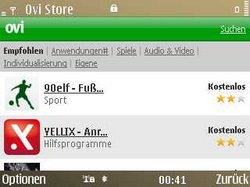 Nokia’s Ovi.com app store or even individual stores on the interwebs – all of these initiatives are pretty much useless if we won’t see more applications like the few good ones above.
Nokia’s Ovi.com app store or even individual stores on the interwebs – all of these initiatives are pretty much useless if we won’t see more applications like the few good ones above.